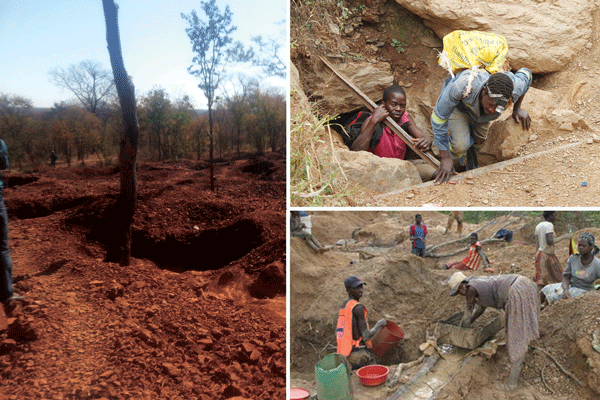
A STENCH of chemicals engulfs the whole of Makaha business centre deep in rural Mudzi, Mashonaland East province. With the area located between mountains, one cannot escape the chocking odour, as the shopping centre and villages are erected at the wind passage way.
BY JAIROS SAUNYAMA

Makaha, one of the latest areas in the country, where gold deposits have been discovered, has given birth to “cyanide barons”, individuals and groups, who have illegally established cyanide tanks used to extract gold despite its harmful nature to the environment, humans and livestock.
In this area, owning a cyanide tank is now a measure of wealth, but it is the ignorance about the environmental effects that irks, as dealers employ the the use of the chemical illegally.
“We cannot afford to engage the Environmental Management Agency (EMA). We are aware that we should legalise our operations. The money to obtain an Environmental Impact Assessment (EIA) certificate will come from these cyanide tanks, that is after we operate for a while,” Thomas Mudzeka (26), who monitors a cyanide tank in Makaha, said.
According to the panners, they buy the cyanide in Msasa, Harare.
Gold cyanidation (also known as the cyanide or the MacArthur-Dingus process) is a metallurgical technique for extracting gold from low-grade ore by converting the gold to a water-soluble co-ordination complex.
Due to the highly poisonous nature of cyanide, the process is controversial and its usage is banned in a number of countries and territories.
- Chamisa under fire over US$120K donation
- Mavhunga puts DeMbare into Chibuku quarterfinals
- Pension funds bet on Cabora Bassa oilfields
- Councils defy govt fire tender directive
Keep Reading
The cyanide tank owners admitted being aware of the detrimental effects of the chemical, but they insisted gold panning was their only source of livelihood.
“This area is dry and not conducive for farming. The discovery of gold deposits is a blessing to us. We have a source of income. We are aware of the environmental implications if we illegally use cyanide in extracting gold from ore, but do we have to die of hunger because of that?” another cyanide tank owner, who refused to be named said.
Despite being used in 90% of gold production, gold cyanidation is controversial due to the toxic nature of cyanide. Consumption of cyanide pollutes water can be tragic for humans. Cyanide spills can have a devastating effect on rivers, sometimes killing everything for several kilometres downstream.
According to experts, cyanide prevents the body from taking up oxygen, resulting in suffocation, which may be fatal to humans and animals without prompt first aid treatment.
Some long-term health effects have been observed with people suffering from goitre and depressed thyroid function.
Currently, EMA and the gold panners are on a collision course with the former issuing tickets to cyanide tank owners. However, the move by EMA is not yielding tangible results, as the construction of cyanide tanks continues rampantly.
EMA education and publicity officer for Mashonaland East province, Astas Mabwe, said 15 people had been fined a combined $7 300 for owning illegal cyanide tanks.
“The situation is bad and we need to come up with solutions to arrest the looming disaster. Cyanide tanks are all over the area and the owners are not even aware of the detrimental effects of cyanide. Cyanide tanks operators are doing so illegally without EIA certificates. We have issued a number of them with tickets to the tune of about $7 000 after we found out that they were operating illegally and in possession of dangerous substances.
“Despite the orders and several tickets issued, the miners are defying the calls to stop operations. The use of cyanide is a cause for concern. Handling and storage should be done under a licence,” he said.
Meanwhile, the Makaha area has become an eyesore, as villagers are digging everywhere in search of the precious mineral.
When NewsDay visited the area recently, villagers were busy mining literally at their doorsteps, with their operations leaving gullies and open pits that are dangerous to humans and livestock.
The villagers have politicised the illegal gold mining activities, saying despite calls to preserve the environment and legalising their operations, they have been recommended to carry on with their activities by government through the Mines ministry.
“We have tried to legalise our activities, but to no avail because the responsible authorities sit on our applications. We will not stop illegal mining because that is our only source of livelihood. Moreover, we were given a grace period of six to eight months by Mines minister (Walter) Chidakwa and other bigwigs who toured this area.
“He allowed us to continue mining on condition that we follow the right procedure towards the acquisition of the necessary mining claims and licences. The minister even promised us that Fidelity Printers would come here to collect the same gold. Fidelity will be stationed at Makaha business centre every Saturday to buy gold from us and EMA is saying stop mining, we are confused.
“Minister Chidakwa told us that we are not gold panners, but small-scale miners,” Benjamin Chiwamira, leader of Kaombeka Syndicate Mine, said.
Makaha used to be a reserved area popularly known as an EPO (exclusive prospective order).
In defence of their territory and illegal activities, the gold panners allegedly kidnapped and assaulted a police officer, who was part of the team sent to arrest illegal miners. Riot police reportedly descended on Makaha to deal with the rogue behaviour.
Kaombeka village head, Sekai Kafuridzo whose homestead has been turned into an open shaft mine, said gold panning would always remain a cash cow for the poor villagers.
“This is how we survive here. The area is dry, and the villagers are poor. We have the resources and let them sustain our lives. This season, no one harvested a single grain. Moreover, the people you found panning at my homestead are not all from this village, they are from other areas,” he said.
During a visit at his homestead, more than 50 youths and women were busy digging in his yard in search for gold. Other villagers have already turned their homesteads and vegetable gardens into mining claims.
The gold rush in Makaha has resulted in people from as far as Nyanga, Kotwa and Mozambique invading the area, where they work for a commission for mining claim owners.
According to the panners, they can realise an average of $2 per day after paying claim owners.
Mabwe said the rampant illegal gold mining in Makaha is cause for concern and that the Mines ministry should do something to curb land degradation that has become the order of the day in the area.
“We are deeply concerned with the illegal mining activities taking place in the Makaha area. There is panning almost everywhere — mountains, homesteads, gardens and along riverbeds. As EMA, we encourage regularisation of the mining process. As a way forward, there is need for co-odination of all stakeholders to stop the destruction of the environment,” he said.
For now, the illegal gold mining has choked Manyuchi River, the biggest water source in the dry area.











